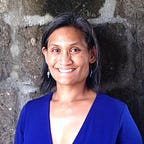Changemaking 2025
At Ashoka: Innovators for the Public, our job is to create frameworks and support that help organizations and individuals deal with a world that is rapidly changing.
Our understanding is that there is a massive change underway — from a hierarchical, top-down, linear model of the world → moving to a meritocratic, “team of teams”, fluid model of the world. These far-reaching conversions are changing how we understand ourselves, how we understand each other, how we engage with one another, how we bring our passions to our daily work, and how we make a positive difference in the world, as individuals and as groups.
I challenge each of you to take a few moments to consider what the world of 2025 will be.
I believe each of us has a hand in co-creating this world: through envisioning it, taking steps to build it, and ultimately being accountable to our shared vision.
We have an opportunity to bring the world’s needs together with the world’s most effective problem solvers — we have an opportunity to practice changemaking in order to create our version of what the world looks like.
Some ideas for you to ruminate upon:
- What does parenting look like? What kind of maternity leave do we give to our mothers? How do mothers, fathers, guardians, foster parents, adoptive parents, and single parents get support? What does labor, birth, and delivery look like? How do the first five years “work” for an infant, toddler, and young child?
- What does a child experience? How much freedom, independence, and responsibility do we expect for children? What does playtime look like? What does school look like? What kind of nutrition and diet have we made a priority for our children?
- What does an adolescent experience? What tools, supports, and resources do we give our teens? What kind of difference do young people feel like they make in their families, schools, communities, and cities?
- What does an adult experience? If we go to college, what does that experience feel like, and who is it available to? Do individuals who work feel like there is a match between their interests and their daily activities? Do individuals feel like agents of change within their circles of influence?
- What is the experience of a senior? Is there retirement? What does an engaged, flourishing life look like at 60, 70, 80, 90, and above?
- What does end of life look like? What tools, supports, resources, and locations, and counselors exist for those dealing with illness, disease, hospice, bereavement, and other issues related to death and dying?
- What kind of institutions exist to guide, support, and shape policy decisions for our lives? Are governments acting in a way that is fair, orderly, and just? Does the majority of our populations receive emotional, physical, academic, nutritional support?
I believe that the careful consideration of the future is an important and worthwhile endeavor, and each of us start to build a mental “bridge” between our actions of today and the world that we intend to live in.
Our decisions today continue to reach into the lived experience of future generations, many years into the future.
The year 2025 is only ten years away, and so we have an opportunity to create that “visionboard” of what we believe that looks like.
I encourage you to share your vision using the hashtag #visionboard.
Need ideas? here’s a download from Dropbox of my inspirational slides I’ve collected over the years: http://tinyurl.com/mapd2020slides. Or view my “year of gratitude” at http://bit.ly/gratitudeyear
